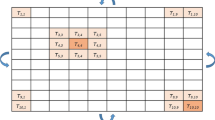Abstract
The cellular genetic algorithm (CGA) combines GAs with cellular automata by spreading an evolving population across a pseudo-landscape. In this study we use insights from ecology to introduce new features, such as disasters and connectivity changes, into the algorithm. We investigate the performance and behaviour of the algorithm on standard GA hard problems. The CGA has the advantage of avoiding premature convergence and outperforms standard GAs on particular problems. A potentially important feature of the algorithm’s behaviour is that the fitness of solutions frequently improves in large jumps following disturbances (culling by patches).
Preview
Unable to display preview. Download preview PDF.
Similar content being viewed by others
References
Belding, T.C. The Distributed Genetic Algorithm Revisited. In Eschelman, L. (Ed.), Proceedings of the Sixth International Conference on Genetic Algorithms, San Francisco, CA: Morgan Kaufmann (1995) 114–121.
Branke, J., Andersen, H.C. and Schmeck, H. Global Selection Methods for Massively Parallel Computers. In Proceedings of AISB’96 workshop on Evolutionary Computing, ed. Fogarty T.C., Lecture Notes in Computer Science 1143, Springer Verlag (1996) 175–188.
Cantu-Paz, E. A Survey of Parallel Genetic Algorithms. IlliGAL Report No.97003, Illinois Genetic Algorithms Laboratory (1997).
Goldberg, D.E. Genetic Algorithms in Search, Optimization and Machine Learning. Reading, Massachusetts: Addison-Wesley Publishing Company, Inc. (1989).
Green, D.G. Emergent Behaviour in Biological Systems. In Green, D.G. and Bossomaier, T.R.J. Complex Systems-from Biology to Computation, Amsterdam: IOS Press (1993) 24–35.
Green, D.G. Connectivity and the evolution of biological systems. Journal of Biological Systems 2(1) (1994) 91–103.
Lin, S., Goodman, E. D. and Punch, W. F. Investigating Parallel Genetic Algorithms on Job Shop Scheduling Problems. In Angeline, P. J. et al., (Eds) Evolutionar Programming VI, Proc. Sixth Internat. Conf., EP97, Springer Verlag, NY,., Indianapolis, (1997) pp.383–394.
Manderick, B and Spiessens, P. Fine-Grained Parallel Genetic Algorithms, In Schaffer, J.D. (Ed) Proceeding of 3rd International Conference on Genetic Algorithms.. Morgan Kaufmann, (1989) pp.428–433.
Michalewicz, Z. Genetic Algorithms + Data Structure = Evolution Programs — Third, Revised and Extended Edition. New York: Springer-Verlag Berlin Heidelberg (1996).
Mitchell, M. An Introduction to Genetic Algorithms. Cambridge, Massachusetts: The MIT Press (1996).
Muhlenbein, H. Parallel genetic algorithms, population genetics, and combinatorial optimisation. In Schaffer, J.D. (Ed.), Proceedings of the Third International Conference on Genetic Algorithms, San Matteo, CA: Morgan Kaufmann, (1989) pp.416–421.
Muhlenbein, H., Gorges-Scheuter, M. and Kramer O. Evolution Algorithms in Combinatorial Optimisation. Parallel Computing, 7, (1988) pp.65–88.
Rudolph, G. and Sprave, J. Significance of Locality and Selection Pressure in the Grand Deluge Evolutionary Algorithm. Proceeding of PPSN’96 (1996).
Whitley, D. Cellular genetic algorithms. In S. Forest, (Ed). Proceedings of the 5th International Conference on Genetic Algorithms. Morgan Kaufmann, (1993) pp.658–662.
Yao, X. Global optimisation by evolutionary algorithms. Proceedings of the Second Aizu International Symposium on Parallel Algorithm/Architecture Synthesis, Aizu-Wakamatsu, Japan, Society Press,.IEEE Computer (1997) pp.282–291.
Author information
Authors and Affiliations
Editor information
Editors and Affiliations
Rights and permissions
Copyright information
© 1999 Springer-Verlag Berlin Heidelberg
About this paper
Cite this paper
Kirley, M., Li, X., Green, D.G. (1999). Investigation of a Cellular Genetic Algorithm that Mimics Landscape Ecology. In: McKay, B., Yao, X., Newton, C.S., Kim, JH., Furuhashi, T. (eds) Simulated Evolution and Learning. SEAL 1998. Lecture Notes in Computer Science(), vol 1585. Springer, Berlin, Heidelberg. https://doi.org/10.1007/3-540-48873-1_13
Download citation
DOI: https://doi.org/10.1007/3-540-48873-1_13
Published:
Publisher Name: Springer, Berlin, Heidelberg
Print ISBN: 978-3-540-65907-5
Online ISBN: 978-3-540-48873-6
eBook Packages: Springer Book Archive




